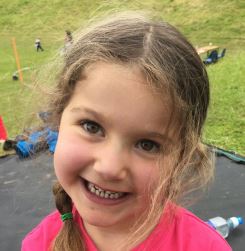The late, wonderful Rabbi Jonathan Sacks, in his book 'Morality' published earlier this year, distinguishes between ambition and vocation.
The former concerns the desire to personally get as much from life as possible whereas the latter, the Jewish and moral approach to meaning and fulfillment is to ask, as John F Kennedy almost did, not what you want from life but what life wants from you.
What are you here to do?
For me the answer lies in three words that we sing in the final verse of the joyful Chanukah hymn Ma'oz Tzur, three words that I've talked about before and that take me back to when Shani would be smiling and joking with us at Chanukah time, singing her primary school songs about yummy doughnuts, spinning dreidels, and marching Maccabees.
The three words are na'aseh nes l'shoshanim, they round off the story of Chanukah as it is presented in the song and literally translate as make miracles for the roses, where roses are used as an allusion for the Jewish people.
However, with Shani's full name being Shoshana, the Hebrew words for rose, the text can also be translated as make miracles for Shani, and as such I would use it as a personal prayer for Shani, for her health and for her miraculous survival.
Since Shani died, I had found it difficult to sing without feeling desperately sad and let down, as if the words and prayers had failed me, they didn't work, they lied, there was no miracle.
But I've now realized that there is another way to read the translation that provides hope rather than despair, light rather than darkness: roses is plural and so the song is actually asking for miracles to be done for all of the Shanis, for all of the children like Shani, for all of the children with pulmonary atresia, or with life-threatening heart conditions, or that are very ill in Great Ormond Street Hospital, or that are likely to die way before they have any right to.
Somehow, by looking at the words in a different way, they become instead of a failed prayer, they become a mission for hope, a call to arms, a chance to save children's lives and make the world a better place, a vocation.
A way to provide a Chanukah light against the darkness: to Shine For Shani.
